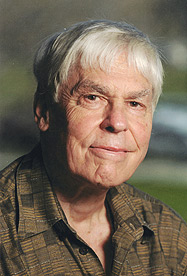Berkeleyan
Stephen Smale awarded Wolf Prize in mathematics
His research has advanced thinking on a wide range of topics, from topology to equilibrium theory
![]()
| 26 January 2007
 Stephen Smale |
Stephen Smale, a professor emeritus of mathematics who has contributed to a broad range of mathematical fields, has been named a recipient of the 2007 Wolf Foundation Prize in Mathematics, one of an array of prestigious prizes awarded yearly by the Israeli foundation.
Smale, 76, who also holds a half-time appointment with the Toyota Technological Institute at the University of Chicago, will share the $100,000 prize with mathematician Harry Furstenberg of Hebrew University of Jerusalem.
Smale's work, which has been called "audacious," has had a fundamental influence on numerous fields of mathematics, garnering him in 1966 the Fields Medal of the International Mathematical Union, often called the Nobel Prize of mathematics. The Wolf Prize honors Smale for "his groundbreaking contributions that have played a fundamental role in shaping differential topology, dynamical systems, mathematical economics, and other subjects in mathematics."
Though retired from Berkeley since 1994, Smale continues to explore new fields, such as learning theory (the mathematical description of nerve connections in the brain that give rise to intelligence and learning); flocking (the tendency of group behavior to look coordinated, as with a flock of birds or a school of fish); and the mathematics of data mining.
A native of Flint, Mich., Smale got off to a mediocre start as an undergraduate at the University of Michigan because of the time he devoted to his leftist political activities, but under threat of expulsion he hunkered down and earned his Ph.D. from that institution in 1957. The following year he made a splash in the infant field of differential topology with a proof that a sphere could be turned inside out without breaking or creating a sharp crease, a trick called an eversion.
In the early 1960s Smale again startled the mathematical world, with a proof of the famous Poincaré Conjecture, though only for dimensions greater than 4. The conjecture was originally formulated in three dimensions, stating that if any loop can be shrunk to a point, the space is the equivalent of a sphere. Essentially, this means that we, living inside a three-dimensional world, can tell whether or not it's a sphere instead of, for example, a doughnut. The generalized Poincaré Conjecture extends this idea to other dimensions.
Smale's proof of the generalized conjecture opened up vast areas of research that were previously untouchable, and was largely responsible for him winning the Fields Medal of the International Mathematical Union (often called the Nobel Prize of mathematics) in 1966.
"[Smale's] proof of the Poincaré Conjecture for dimensions bigger or equal to 5 is one of the great mathematical achievements of the 20th century," the Wolf Foundation jury wrote. An extension of this proof, his so-called "h-cobordism theorem," "has become probably the most basic tool in differential geometry," the jury said.
Smale joined the Berkeley Department of Mathematics in 1960, left for three years to teach at Columbia University, then returned to Berkeley in 1964 as a full professor.
During the 1960s, according to the Wolf jury, Smale also reshaped the view of the world of dynamical systems, primarily systems of moving objects governed by non-linear laws that make calculation of their ultimate behavior difficult or impossible. In the 1970s he began work on mathematical economics and non-linear models of economic behavior. Basing his analysis methods on differential topology, he recast the foundations of much of equilibrium theory.
This economic work led in the early 1980s to a consideration of the general problems of complex computations, such as those now relegated to computers. Among his contributions were calculations of how long it takes for several standard algorithms to converge to a solution of a problem. He also showed why the simplest and most widely used method to solve linear programming problems - the simplex algorithm - works in almost all cases. His results have been of immense importance because much of the world's computation on computers involves linear programming.
After retiring from Berkeley in 1994, Smale served as a Distinguished Professor at the City University of Hong Kong from 1995 to 2001, then joined Toyota Tech to help build up its research and teaching, he says.
Smale is a member of the National Academy of Sciences, a fellow of the American Academy of Arts and Sciences, a 1996 winner of the National Medal of Science, and the subject of a 2000 biography, Stephen Smale: The Mathematician Who Broke the Dimension Barrier, by Steve Batterson. Other honors include the 1965 Veblen Prize for Geometry, awarded every five years by the American Mathematical Society; in 1988, the Chauvenet Prize by the Mathematical Association of America; and, in 1989, the Von Neumann Award by the Society for Industrial and Applied Mathematics.
The Wolf Foundation award will be presented to the laureates by the president of Israel in a special ceremony at the Chagall Hall of the Knesset building (Israel's parliament) in Jerusalem on Sunday, May 13.

